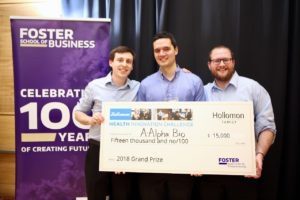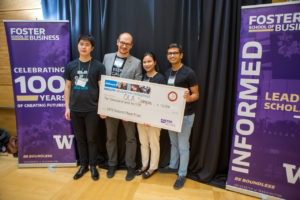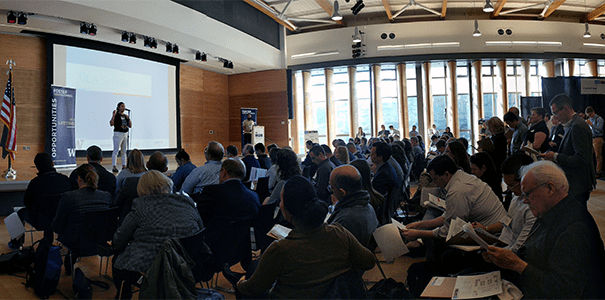Ten teams involving UW BioE students were among 22 teams to compete in 2018’s Holloman Health Innovation Challenge (HIC), held March 1st. Of these, two, A-Alpha Bio and OLA Simple, received the first and second place prizes, and $25,000 of startup funding. Learn more about the competition at the UW Foster School Blog and a recent Geekwire article.
The HIC, held by the UW Foster School of Business Buerk Center for Entrepreneurship, serves to recognize student entrepreneurs who seek to address important issues in health care, and give them the chance to win seed funding to advance their ideas to the next stage. It also provides students with the opportunity to network and collaborate, and to build entrepreneurial skills.
It is modeled after the Buerk Center’s two other innovation competitions, the Alaska Airlines Environmental Innovation Challenge and its signature event, the UW Business Plan Competition. The Buerk Center founded the HIC in 2016 after realizing that a critical mass of health care and biotechnology teams were entering the Business Plan Competition. In the first HIC, two teams from BioE took home the second and third place prizes, and in 2017 one BioE team won second place.
Grand Prize – A-Alpha Bio

A-Alpha Bio team members
Credit: Mark Stone/UW
This year’s $15,000 Holloman Family grand prize went to A-Alpha Bio, led by Ph.D. alumnus David Younger and current Ph.D. students Randolph Lopez and Bob Lamm. With their technology, AlphaSeq, the team aims to provide a comprehensive, cost-effective drug screening platform to pharmaceutical companies.
Currently, drugs can only be screened for one possible protein interaction at a time, which is time and resource-intensive. AlphaSeq offers a novel solution which allows the screening of thousands of possible interactions at once. This efficient technology could offer rapid, thorough insight into a drug’s efficacy and possible adverse effects before it enters clinical trials. By enabling pharmaceutical companies to fully characterize their drugs in the preclinical trial phase, AlphaSeq could help bring safer drugs to market more quickly at a lower research and development cost. Read more about the technology behind A-Alpha Bio.
Second Place Prize – OLA Simple

OLA Simple team members
Credit: Mark Stone/University of Washington
The $10,000 Herbert B. Jones Foundation second place prize went to OLA Simple, led by BioE Ph.D. students Nuttada Panpradist and Qin Wang, BioE Ph.D. alumnus Joshua Buser and Electrical Engineering alumnus Rahil Jain. The team developed a point-of-care platform that aims to revolutionize the diagnostics, predictive outcomes and therapy for genetic disorders and conditions.
OLA Simple is based on Nuttada’s work to create an instrument-free, point-of-care device that can diagnose HIV, and detect both drug resistance and viral load. This versatile technology detects single base mutations in nucleic acids, and can be adapted for many health conditions. OLA Simple is designed to be fast, affordable and simple to use, and accessible to low-resource settings where sophisticated and expensive lab tests are out of reach. In 2016, Nuttada received the $50,000 Third Place APF Student Technology Prize for Primary Healthcare for her work on OLA Simple.
Other Teams
A third team involving a BioE student received one of the competition’s three $1,000 Judges Really Liked prizes. Nanodropper, led by BioE undergraduate Mackenzie Andrews, pharmacology graduate students Joshua Cohen and Jennifer Steger, and business graduate student Cristina Sainati, created an affordable universal eye drop adapter. With this device, the team aims to reduce the cost, waste and side effects associated with expensive prescription eye medications.
Other BioE-affiliated teams competing in the HIC’s final round include:
- 4th Phase – A patented water technology that improves crop yield with a modular turnkey device compatible with existing indoor farm operations. (Bioengineering, Materials Science and Engineering, Business)
- Anophelseize – Anophelseize is an efficient, low-cost capturing device for male mosquitoes of the species Anopheles gambiae to be used for field research in malaria zones. (Bioengineering, Biochemistry)
- BWB Hydration – Prevention of unnecessary mortality of children due to diarrheal disease by providing a low-cost, easily accessible diagnostic tool for determining the best treatment options for dehydration in low-resource areas. (Bioengineering)
- Chromastat – Reducing the amount of time and effort needed to maintain cell cultures used in biotechnology with a low-cost closed loop control system that allows users to precisely control culture conditions. (Bioengineering, Biochemistry, Entrepreneurship, Informatics, Computer Science and Education)
- FreedomFit – A dynamic and shape-changing transvaginal orthotic support (a “pessary”) to treat pelvic organ prolapse—a condition that affects up to 50% of women in their lifetime. (Bioengineering)
- Luna Medical – A novel solution to rectify current deficiencies in treating the scapholunate ligament tear in the wrist that will hold the bones in place better and prevent gapping post-surgery to avoid future re-intervention and improve patient quality of life. (Bioengineering)
- Tensure – FASCIO by Tensure is an assistive surgical device that promotes consistent suture tension in order to mitigate the incidence of incisional hernia. (Bioengineering)

















